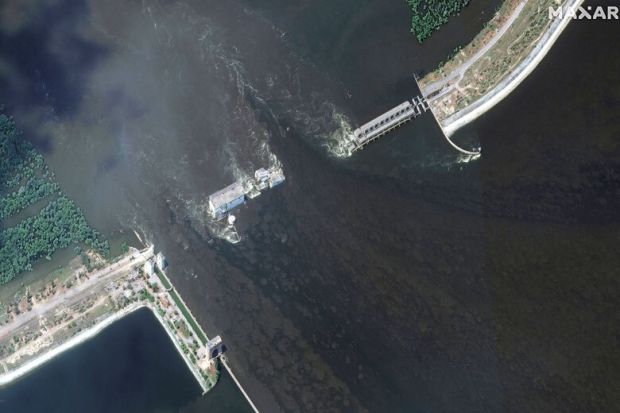The destruction of the Nova Kakhovka dam is just the latest atrocity since Russia’s full-scale invasion to tear at the soul of Western-based Ukrainian academics who, like me, are obliged by the paucity of positions in Ukrainian studies to teach courses on Russian language and culture.
International organisations such as the Nato Parliamentary Assembly and the Parliamentary Assembly of the Council of Europe (Pace) already recognise that Russian crimes during its invasion and occupation of Ukraine fall under the category of genocide, and the International Criminal Court has issued arrest warrants for Vladimir Putin and Maria Lvova-Belova, Russia’s presidential commissioner for children’s rights, for the unlawful deportation of children from Ukraine to Russia.
Russia’s invasion of Ukraine in February last year has prompted some overdue efforts to reconsider the ways Russian culture classes are taught. But those efforts, while praiseworthy, are patchy and slow. Many Russianists have yet to engage seriously with the dark side of Russian culture, which feeds the chauvinistic and imperialistic attitudes that Russia has towards Ukrainians (as well as towards non-Russian nationalities and ethnicities in Russia).
Russian culture has been politicised since the days of the Russian Empire, and it has been used by Russian imperialists to promote the idea of Russia’s “greatness”. This thinking persisted and became part of the Soviet ideology, in which Russians were presented as “first among equals”. And it is also reflected in the West.
For decades, representative works of Russian literature, ballet, music and art have been almost unquestionably considered global masterpieces. Academics in Russian studies, too, have embraced these notions, not least because they boost student recruitment.
Moreover, academic discussion of the “great Russian culture” has typically included works created anywhere in the Russian Empire or the former USSR, overlooking the fact that many renowned Russophone writers, artists and other historical figures were born and raised outside Russia. Both of these tendencies have contributed to the tenacity of imperial and colonial narratives that Russia, directly or discreetly, maintains to this day.
The extent to which biased and misleading representations of Russia have coloured Western perceptions of it is illustrated in popular culture. For instance, the Walt Disney film Anastasia (1997) not only took liberties with the portrayal of historical events that led to the collapse of the Russian Empire but also amplified a romantic image of the empire.
But we should expect better from academic experts – even if self-decolonisation, as we might call it, can be uncomfortable because it requires Russianists to come to terms with their own lack of knowledge or even self-deception about Russian cultural superiority. The production of new knowledge takes humility and diligence, as well as responsibility.
In my case, I have felt compelled, since the invasion began, to use my teaching to counter Russia’s frequently repeated narratives about Ukraine’s historical inseparability from the “great motherland” and its inability to act as a political player and partner. It has been challenging to explain why it is historically, politically and culturally unacceptable to define both Crimea and Donbas as “Russian”, and I have been accused (by some colleagues and students) of being biased and emotional for doing so.
I was patronised with comments such as: “We understand, this topic is emotional for you, but the war in Ukraine is complicated.” Russianists sympathise with the suffering of Ukrainians, before adding that Russians are also suffering. But are Russian homes being bombed? Are Russian children being kidnapped and deported? Are Russian civilians being tortured and executed simply because they are Russians? For me and my Ukrainian compatriots, the war is anything but complicated: the Ukrainians are fighting for their existence, for their right to be distinct from Russians and to have their own state.
What does bias even mean for a person who teaches a course on a country that annihilates her own? How can we define the “one-sidedness” of a person whose family and friends live under the daily threat of a missile hitting their homes? Is there such a thing as unbiasedness towards Nazi Germany, for instance?
Changes will take place in Russian studies eventually, but not as fast as many outside the discipline hoped when the full-scale invasion took place. Some colleagues point to bureaucratic hurdles that make immediate changes impossible, but the scale of atrocities committed by Russia renders that argument woefully inadequate.
By focusing on the war and critically re-evaluating the Russocentric approaches to Russian studies that contribute to the sustainability of the “Russian great culture” narrative, I took responsibility for the courses that I taught on Russia in 2022. I do hope that the latest atrocity committed by Russia, and the unfolding environmental disaster, encourages a similar approach by those Russianists who, so far, have been more willing to engage in a conversation about how “complicated” the war is than one about Russia’s responsibility for crimes against humanity.
After all, wars sharpen questions of moral obligation and responsibility, and maybe this is what we need today in the educational system.
This autumn, Nataliya Shpylova-Saeed joins the department of Slavic languages and literatures at Harvard University as a preceptor in Ukrainian. During 2022-23, she was a visiting assistant professor in the Russian and Eurasian programme at Colgate University, in Hamilton, New York.
Register to continue
Why register?
- Registration is free and only takes a moment
- Once registered, you can read 3 articles a month
- Sign up for our newsletter
Subscribe
Or subscribe for unlimited access to:
- Unlimited access to news, views, insights & reviews
- Digital editions
- Digital access to THE’s university and college rankings analysis
Already registered or a current subscriber? Login




